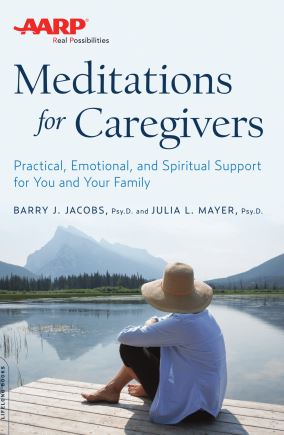Review of AARP’s Meditations for Caregivers Book
 AARP’s Meditations for Caregivers has a little bit of everything for the busy caregiver. Over 150 caregiver stories grouped into 28 topics from Anger and Anxiety to Flexibility and Gratitude. Guilt, Humor, Mindfulness, and Sacrifice are some of the other topics covered across 200-plus pages.
AARP’s Meditations for Caregivers has a little bit of everything for the busy caregiver. Over 150 caregiver stories grouped into 28 topics from Anger and Anxiety to Flexibility and Gratitude. Guilt, Humor, Mindfulness, and Sacrifice are some of the other topics covered across 200-plus pages.
According to the authors, Jacobs and Mayer, most of the stories are gathered from their 25 years of psychotherapy practice with enough details changed to protect their clients’ privacy. The authors, who were also caregivers, share a few of their own stories. At the end of each story, the authors have written a one- or two-sentence italicized comment.
I’ve been a fan of Barry Jacobs after eagerly reading his answers to people’s questions in Take Care! the quarterly newsletter of the National Family Caregivers Association, which rebranded as the Caregiver Action Network in 2o12. I found his answers insightful, heartfelt, and spot on.
In the Introduction, the authors write, “When we are most frustrated we put ourselves in Jean’s [Barry’s headstrong mother] position and imagine what we would feel like if we were her.” This is living testimony of the Diamond Tip of Caregiving in action and goes beyond the Golden Rule.
Appetizer
Yet, Meditations for Caregivers seems to be more of a hastily prepared appetizer. The personal touches Jacobs is known for were few and far between. Curious, I read Jacobs’ bio. He’s involved in so many different things, I wonder how he found the time to collaborate with his wife on this book.
It’s hard being even a tad critical of a book from AARP, an organization that boasts nearly 38 million members. It’s harder still when the book has received so much advance praise by leaders in the industry. Did each one read it cover to cover as I did? My fate is sealed as I finish this review. I look at Amazon and this book is listed as a Best Seller at #1 in the Books > Parenting & Relationships > Aging Parents category.
But let’s be honest here, family caregivers are dealing with issues that can’t be resolved in one page. Caregiving is messy. It often takes days to resolve an issue and even years. I’m not sure caregivers will be inspired to meditate on these neatly packaged one-page stories. Worse, they may feel inept.
Savory Hors d’Oeuvres
Still there are a few hors d’oeuvres to savor.
The authors introduce the Grief chapter with, “Grief, despite its intense pain, is a gift. It reflects our intense love, longings, and fears about the future…”
A quote by author Joan Didion sets the tone for the chapter on Respect: To free us from the expectations of others, to give us back to ourselves – there lies the great, singular power of self-respect.
The authors’ italicized comment in the Humility chapter, though simply stated, is sound advice for the caregiver who wishes to survive: Caring for our loved ones requires flexibility, dedication, and humility. We have to accept we may have to adjust our own plans or goals to accommodate their needs.
Jacobs learns a lesson after irritating the nursing supervisor by being too eager to help his stepfather. “Being too sure of what we know may close us off to the insights of others. Appreciate what you know; savor the contributions that others may have to offer.”
A caregiver who laments her mother’s forgetting, decides instead to gift others on her own birthday and feels uplifted.
Many of the short narrations lacked the depth of emotions–the angst or utter joy felt by primary (hands-on) caregivers. Instead of briefly overviewing the stories while changing the names to protect their clients’ privacy, another approach would have been to seek actual volunteers who agree to help others with their stories. We are called careGIVERS because we give. AARP would have produced a much more meaningful book.








